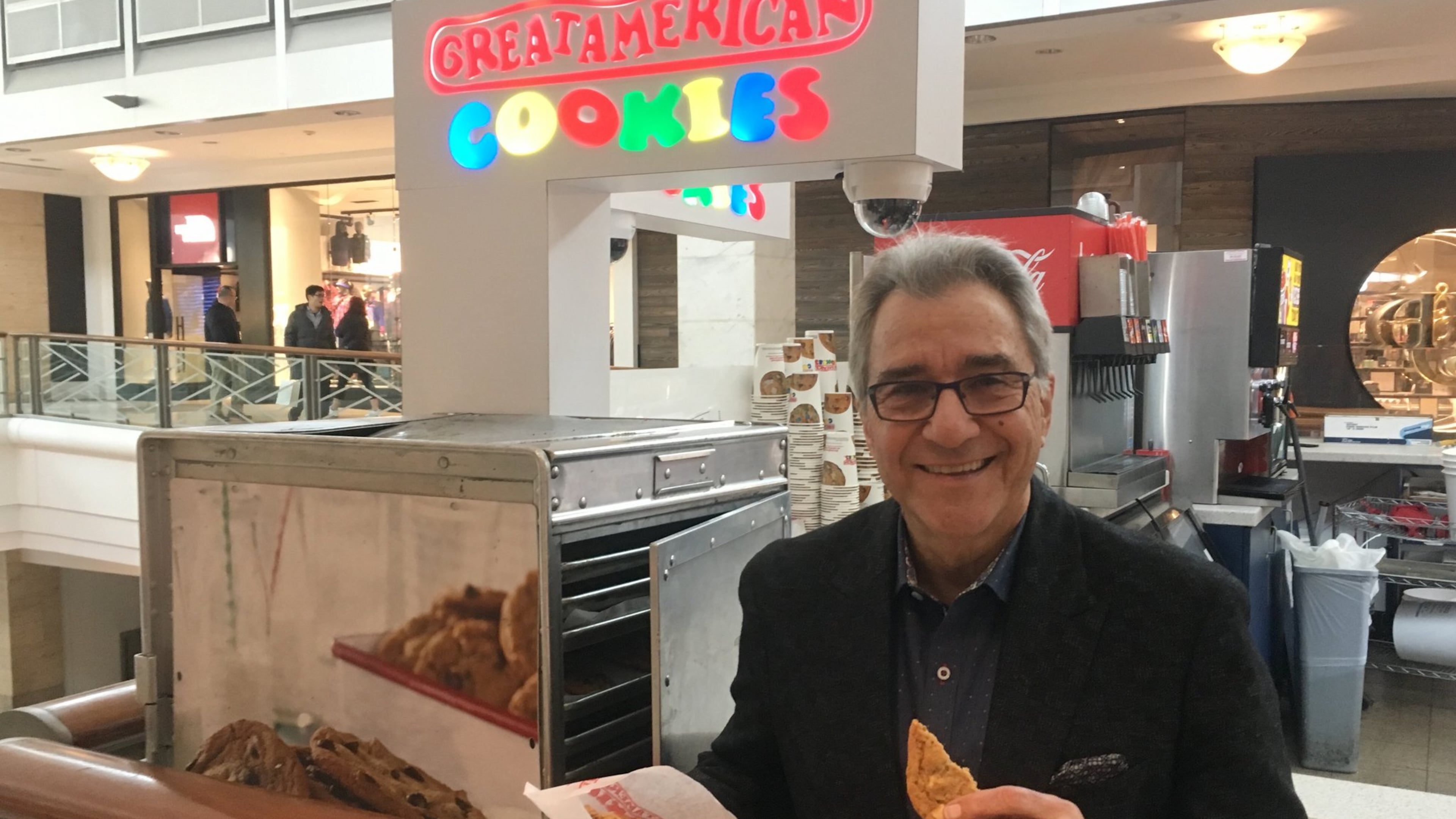“It’s not complicated. It’s cookies.” Wit and wisdom from Michael Coles

Michael Coles literally crashed. He literally burned. He literally had to learn to put one foot in front of the other.
The memoir from the entrepreneur who founded Great American Cookies and later served as CEO of Caribou Coffee isn’t a collection of cliched business tropes.
Instead, “Time to Get Tough: How Cookies, Coffee and a Crash Let to Success in Business and Life” (written with Catherine M. Lewis and published by University of Georgia Press), is a rollicking, revealing read.
Candid anecdotes abound. For example, that first day in the cookie business was going great until Coles realized he and partner Arthur Karp had forgotten one tiny detail: oven mitts. The first batch of inventory went up in smoke.
The business — first known as The Original Great American Chocolate Chip Cookie Company, then Great American Cookie Company before its current rebranding — recovered nicely. But Coles’ own recovery was a grueling one after a motorcycle crash that left his doctors warning he’d never walk unassisted again. Thanks to rigorous rehab, he’s getting around just fine today on two feet — and on two wheels. He has twice traversed the country on his bicycle.
“I walk around every day amazed that my life turned out the way it did,” Coles said. “I’m very grateful for all that’s happened.”
Coles’ fellow cycling enthusiast, Jim Kennedy, chairman of Cox Enterprises, which owns The Atlanta Journal-Constitution, wrote the book’s foreword.
“I didn’t write this book to boast about my career,” said Coles, for whom the business college at Kennesaw State University is named. “I really want to try to lift people up.”
We met with Coles — who celebrates his 75th birthday with about 300 of his closest friends at a private party on Feb. 9 — at (where else?) the Buckhead location of Great American Cookies.
Q: Great American Cookies, which started with a Perimeter Mall location in 1977, flourished in the golden age of shopping malls. Today, many malls across the country are struggling, repurposing or even closing. Can they turn things around?
A: Malls, like everything else, probably got a little overbuilt. Malls need to go back to what made them great. In most cases, they became the town centers of their community. Instead of putting a Costco 300 feet from the mall, they should be an anchor. Give people a reason to do one-stop shopping.
Q: What are your thoughts on brick-and-mortar retail in general?
A: A lot of retail has lost its way. A lot of them thought they were going to discount their way to success. Now, no one buys anything at regular price.
Coles, who writes about the garage sales he operated as a kid and the long hours he worked for an exacting haberdasher as a teenager, also lamented the diminishing art of customer service. Walking through Lenox, he noted the person manning a certain store’s counter was so engrossed with her phone that she didn’t notice the customers standing in front of her.
“When I worked in retail, we were not allowed to use the phone, unless it was an emergency. If Irving would have seen me on the phone, he would have hung it up,” Coles said, referring to his boss and mentor, Irving Settler, owner of a Miami Beach men’s store. “How many times do you walk into a retail store and you’re walking around before someone has the courtesy to look up and say, ‘Oh, hi, how can I help you?’”
Q: You had to give away your dog, Lucky, when your family moved from upstate New York to south Florida after your father's bankruptcy (as a result of a warehouse fire). As a high school senior,you had to sell your prized 1955 Plymouth, that you'd paid for yourself, to help with expenses. How did early struggles influence you?
A: When I got my first paycheck, I felt a real sense of pride. I think, without knowing the term, I grew up with a 'pay it forward' attitude, which is why I mentor so many people.
Q: You ran for the U.S. Congress (against Newt Gingrich in 1996) and the U.S. Senate (against the late Paul Coverdell in 1998). Any further political ambitions?
A: One of the biggest disappointments I ever had (was not being elected). It was not about a job. I already had a job. I was so sick of what was happening. All I wanted was someone who would go to Washington and not care about being reelected, someone who would go up there and get the job done. In the U.S. Senate race,I didn't go into the race knowing much about veterans' benefits. I came out with a nag in my heart that, to this moment, has never gone away. I never realized how mistreated, how lied to (veterans have been), how the government has broken just about every promise to veterans.
Q: If you were starting your career today, what business would you go into?
A: I'd probably go back in the cookie business, a very high end gourmet cookie shop. It would not be focused on retail stores. If I were running the cookie company today, I would build 2,000 square-foot stores and put in party rooms. The thing I loved about being in the food business is how quickly how we would turn over inventory, and you eat your mistakes. It's not like I'm a Steve Jobs. I basically built a chain of lemonade stands. It's not complicated. It's cookies.



